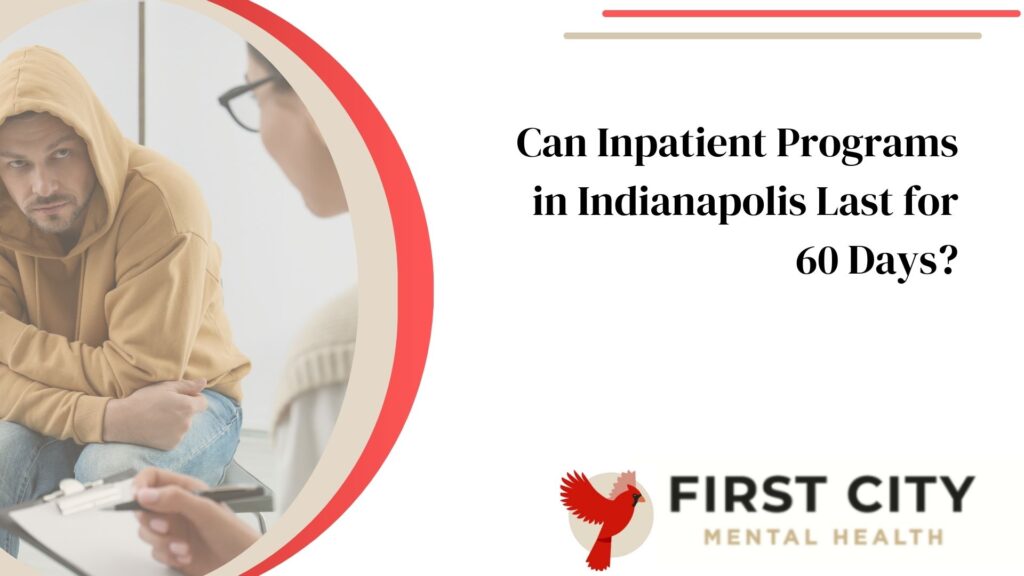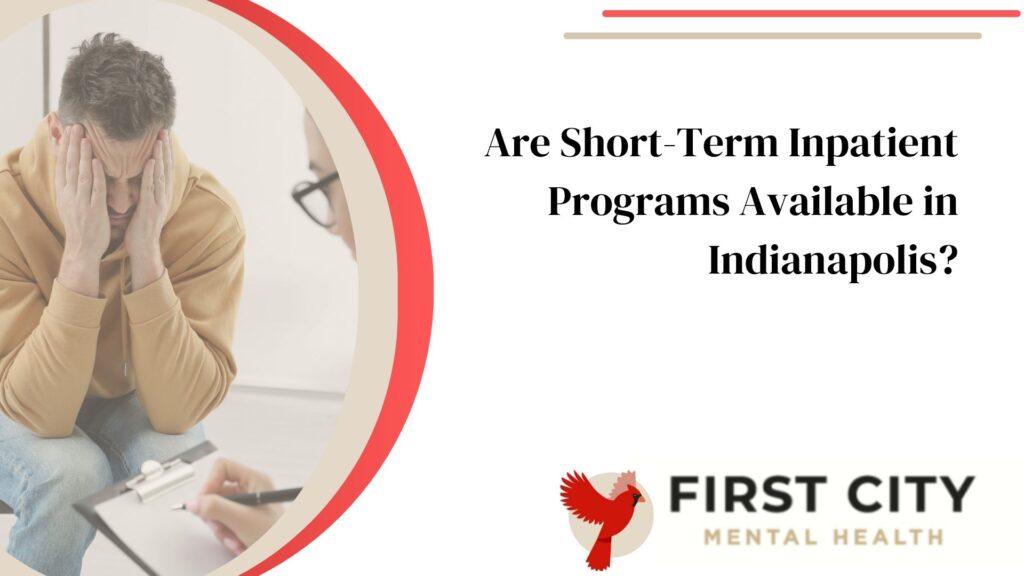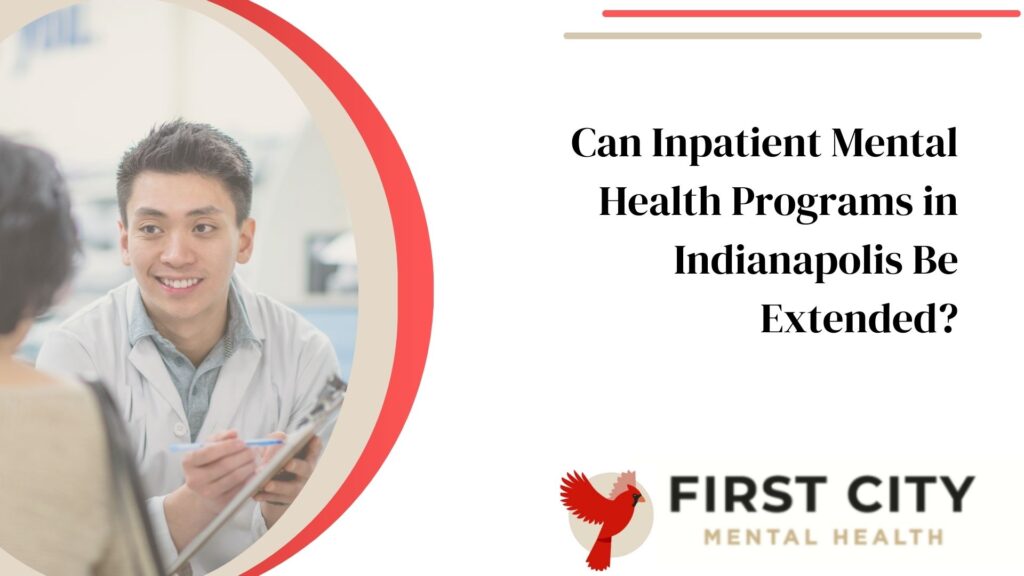
How Can I Enroll in an Inpatient Mental Health Facilities in Indianapolis?
January 15, 2025
What Are the Pros of Enrolling in an Anxiety Treatment Center?
January 15, 2025Deciding to go into Indianapolis inpatient mental health care is a big step, but part of it is the ability to keep a person safe. When someone’s well-being is at stake, this is what makes all the difference. This level of care provides constant supervision
Did you know that one in five adults has mental health issues each year? In Indianapolis, we have inpatient mental health services that are incredibly helpful. These services offer a safe space and expert care. From therapy sessions to tailored treatment plans, they cater to a range of needs.
At First City Mental Health Center, we witness how programs foster healing and growth. Our mission is to ensure he doesn’t feel like he’s going it alone. With their resources available and an entire team devoted to each of them, Indianapolis is hope on a stick. Let’s talk about how these services can benefit our community.
Key Takeaways
- Inpatient mental health programs in Indianapolis range from a few days to several weeks. The duration is unique to the individual’s needs and the type of program.
- Inpatient programs can be as long as 60 days in Indianapolis. These programs offer more intensive treatment and extended care.
- PTSD programs in the area offer different lengths of treatment. These programs provide holistic care based on each person’s recovery journey.
- Short-term inpatient programs can be found in Indianapolis. They offer immediate stabilization and support for those moving to outpatient care.
- Dual diagnosis programs address both mental health conditions and addiction. The length of these programs depends on the nature of the treatment needed.
- Programs for co-occurring disorders and substance abuse offer flexibility. You can choose to make more time for the recovery if you need it.
What Is the Average Duration of Inpatient Mental Health Programs in Indianapolis?
Typical Program Length
Inpatient mental health facilities Indianapolis programs are typically about 30 days. Some programs may be as short as two weeks; others may have you in the program for 90 days. The length tends to depend on the patients’ needs and the type of treatment. For example, someone suffering from severe depression may require more time than someone with anxiety.
Facilities typically evaluate patients to determine the optimal period during which they should receive treatment. This means each person receives a customized plan to aid in their recovery.
Factors Influencing Duration
Several factors can impact how long someone stays in an inpatient program. The severity of the mental health condition is a big one. Someone with acute symptoms may need more time to stabilize. The type of therapy provided makes a difference, too.
Other therapies require more time to work, such as cognitive behavioral therapy or dialectical behavior therapy. Insurance coverage can also dictate how long you can go; some plans limit the length of stay. It is important to keep this in mind when looking at inpatient care.
Can Inpatient Programs in Indianapolis Last for 60 Days?

Understanding the Length of Inpatient Programs
Staff in inpatient mental health Indianapolis may note that it can last up to 60 days. These programs aim to offer broad care and serve people who may require more than 30 days of treatment.
All of that takes more time, and the extended time allows for deeper work on both acute and underlying mental health issues. Staying longer gives us the opportunity to face our problems directly. We can learn new coping skills and practice them in a safe environment.
What to Expect During a 60-Day Program
During your 60-day stay, you’ll follow a regimented routine. The routine will consist of both individual therapy and engaging group sessions as well as fun recreational activities. Programs may also provide specialized therapies such as art or music, which can be very beneficial in establishing emotional expression.
That extended period helps us make some useful insights. It also allows us to apply these insights, so the transition back to everyday life after discharge is much easier.
What Is the Typical Length of PTSD Programs in Indianapolis?
Understanding PTSD and Its Impact
In talking about PTSD, or Post-Traumatic Stress Disorder, the symptoms that we talk about manifest themselves. Sometimes they show up just months after a traumatic event, but other times, they can take years to surface. That could take years, which can be emotionally distressing and difficult for people to handle on a day-to-day basis. Avoidance behaviors and impaired daily functioning are common, and that’s where treatment comes in handy.
Treatment Options and Expertise
There are several PTSD treatment options in Indianapolis. The exact length of programs can also be murky. Professionals such as Allison Pugh, who has 18 years of experience treating mental health and substance use disorders, make huge contributions to the field.
At First City Recovery Center, best inpatient mental health facilities in Indiana craft individualized treatment plans. It’s locally owned and works to solve addiction and mental health issues in the area. They combine therapies, such as cognitive-behavioral therapy (CBT) and medication management, which can effectively treat PTSD symptoms.
Community Support and Recovery
People who work at First City Recovery Center, are part of the key to making that happen. Nathan shares insights from recovery meetings. Meanwhile, Lindsay focuses on medication management for PTSD and other mental health diagnoses. This team approach ensures a fully integrated treatment plan. The program’s length will vary; it’s customized to your specific needs.
Are Short-Term Inpatient Programs Available in Indianapolis?

Intensive Therapy and Counseling
In Indianapolis, various brief course inpatient programs are offered if you’re seeking mental health treatment. Options Behavioral Health offers a 28-day intensive therapy treatment, including counseling with adolescent inpatient mental health facilities Indiana. What makes this program unique is that patients participate in daily process and activity groups.
These sessions, led by skilled nursing and counseling staff, are modeled as structured environments that foster healing and understanding. Another major piece is psychoeducation groups that teach patients about their conditions. For instance, these could include modules on stress management or coping skills, ensuring patients learn practical tools for recovery.
Detox and Group Therapy
Detox is essential to preparing the body safely for recovery while reducing health risks. A lot of programs in Indianapolis build this process in. It allows patients to focus on their mental health without being distracted by physical limitations. Wabash Recovery includes daily group sessions, which last 1-2 hours, as the foundation of their residential treatment.
These sessions cultivate a community of support, essential for people navigating their challenges. These programs focus on both teens and adults. They tailor the intensity and duration of therapy to common needs depending on age.
Personalized Care for Teens and Adults
For teens, personalized care is key. Evolve’s residential programs take a maximum of six teens at a time, meaning they get extremely personalized attention. Teens flourish when they have individual and family therapy at least five times a week. They also receive useful support from daily group sessions and weekly psychiatry appointments.
Adults typically spend three to seven days in the hospital. For those over 55, that stay can be up to 14 days. Newport Healthcare offers a 30-day program with a 90% success rate. This shows the power of personalized care when it comes to long-term recovery.
How Long Are Dual Diagnosis Programs in Indianapolis?
Duration of Treatment Programs
Dual diagnosis mental health facilities in Indianapolis often last for varying amounts of time depending on individual needs. At our hospital, we offer an Intensive Outpatient Program (IOP), giving three hours of treatment three days a week. The program usually takes four to six weeks. Here’s the thing — it’s not one-size-fits-all. Every individual’s journey is different. The length of stay can vary, depending on individual progress and personal goals.
A 30-day rehab program offers short-term, intensive treatment for substance use disorders. This type of program works well for anyone who needs a regimented environment to begin their recovery. An aftercare plan is important for sustaining your progress. It helps ease you back into independent living and helps keep you from relapsing.
Addressing Dual Diagnosis
Only around 9.1% of individuals get treated for both their Inpatient mental health disorder and addiction. That shows a huge care gap, which dual diagnosis programs look to fill. A 2020 study by the CDC and the National Institute on Drug Abuse found some good news. It showed that 75% of people with substance use disorders eventually enter recovery. This underscores the potential for positive outcomes when comprehensive, continued care is provided.
How Long Are Programs for Co-Occurring Disorders in Indianapolis?
Understanding Program Duration
Regarding the length of programs treating co-occurring disorders, Indianapolis offers a wide range of options. We see programs like the 30-day rehab. It lays an excellent groundwork for new members who are just beginning their recovery journey. For adolescents and young adults at places like the inpatient mental health Treatment Center, the emphasis is on long-term care. This center offers comprehensive care. They provide long-term care and treatment for as long as you need it. It’s all about making sure everyone receives the right kind of help to heal.
Factors Affecting Length
There are several reasons someone may stay in a program. Unfortunately, less than 42% of people who go into treatment complete it because of problems such as money problems or personal issues. Some programs, such as the one at Crossroad in Fort Wayne, prioritize discharge planning from day one.
This method allows residents to stay on task and on point. Crossroad has different programs for kids and teens ranging in age from 6 to 21. These programs have both short-term options and longer residential care options. This variation caters to different needs, whether someone needs a quick start or extensive help.
The Importance of Continued Care
We can’t stress enough how important continued care is. The CDC and National Institute on Drug Abuse found that 75% of people with substance use disorders do go on to recover. This recovery is usually done with ongoing support.
The Treatment Center gets it. They emphasize continuity of care to help kids and young adults build promising futures. Since 1883, places like Crossroad have focused on helping families and children. Their efforts demonstrate that recovery is possible with the right support.
Do Programs for Substance Abuse Last Longer in Indianapolis?
Residential Treatment Programs
In Indianapolis, we hear about some residential treatment programs that are available. Take Zinnia Healing Indiana, for instance. They are doing a 30-day residential program aimed at building strong support systems for people.
They want to support participants through long-term sobriety. First City Recovery Center delivers a well-rounded treatment program. It incorporates withdrawal support for drugs and alcohol, setting the stage for long-term recovery. Evolve Indy has an impressive clinical program.
It targets Substance Use Disorder and Dual Diagnosis treatment, specifically. They make it a warm and welcoming place for anyone. Then, of course, there’s Avenues at Fort Wayne. They launch a top-of-the-line clinical program with a team that’s both expert and dedicated. Their modern inpatient mental health facilities help clients feel at home and get healing underway quickly.
Specialized Programs and Facilities
For those looking for specialized care, Indianapolis has its share. Newport Healthcare specifically serves individuals ages 12-35. It provides an integrated blend of psychiatric care, medication management, and life skills programming. Resource Treatment Center goes above and beyond with comprehensive levels of care, with residential inpatient services and detoxification.
Meanwhile, Boca Recovery Center at Bloomington offers a breathtaking backdrop for medical detox and treatment. Don’t even get us started on Skywood Recovery Center. We use a multi-modality approach that incorporates therapies like cognitive behavioral therapy. This method even has an impressive 75% success rate of clients remaining sober after six months.
Can Inpatient Mental Health Programs in Indianapolis Be Extended?

Inpatient mental health facilities Indianapolis are where folks receive continuous care in a secure setting. These programs are important for patients who require additional assistance, such as when experiencing severe depression or anxiety.
In Indianapolis, these programs provide a structured environment with medical professionals to support efforts in overcoming mental health struggles. There is a place to focus on recovery without the distractions of everyday life.
Extending these programs could be necessary when someone isn’t ready to transition back to their normal life. Sometimes we need more time to build coping skills or adjust our medications. That extra time can make an enormous difference in our recovery journey. If you purchase an extended warranty on the car, it’s good to know it will be protected. It also provides an extra layer of security.
Conclusion
We’ve written a lot about best inpatient mental health facilities in Indiana. Each program has its own timeline and focus. We found program durations varied. Some last a few weeks, some up to 60 days or more. It all depends on what the person needs.
There are short-term options too, so it’s flexible for those who need that. We saw how dual diagnosis and co-occurring disorder programs work with specific timelines. Substance abuse programs may take longer, reflecting their complexity. Extensions are optional if you need them.
It’s this broad spectrum that guarantees there’s something for everyone here. We believe this information guides decisions. Take a look at these options and see what’s best for you or a loved one.
Take the next step toward a better mental health journey. Reach out and get the support you need.
Frequently Asked Questions
What is the average duration of inpatient mental health programs in Indianapolis?
Inpatient mental health programs in Indianapolis usually last 30 to 90 days. It varies depending on your specific needs and the treatment you receive.
Can inpatient mental health programs in Indianapolis last longer than 60 days?
Some inpatient programs in Indianapolis last longer than 60 days. Programs are individualized to recovery needs, so everyone is well taken care of.
Are there short-term inpatient mental health programs in Indianapolis?
Yes, there are short-term inpatient programs in Indianapolis. These typically last 7–14 days, designed for stabilization and on-demand support.
How long do dual diagnosis programs in Indianapolis last?
Dual diagnosis programs in Indianapolis treat mental health and substance use disorder at the same time.






